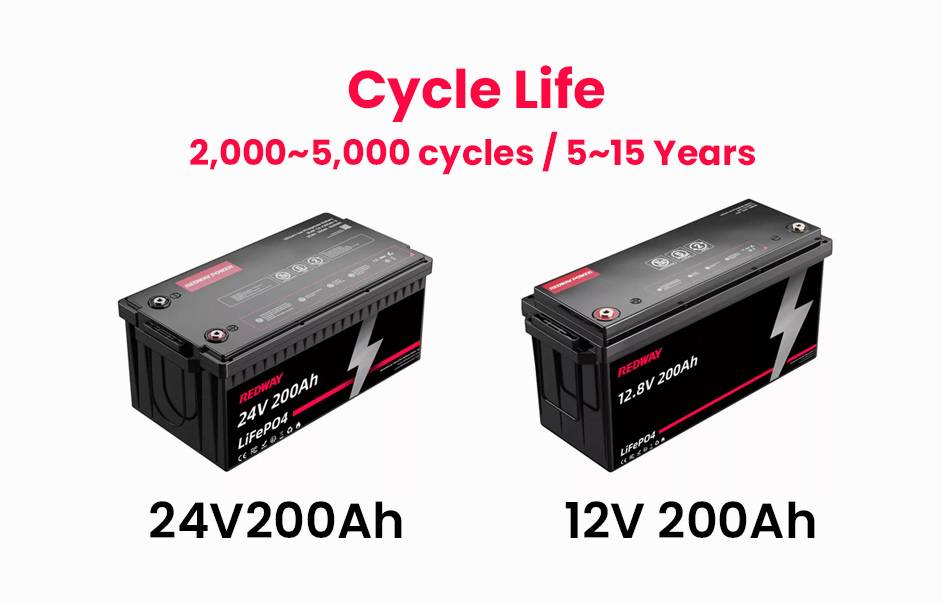- Forklift Lithium Battery
-
48V
- 48V 210Ah
- 48V 300Ah
- 48V 420Ah (949 x 349 x 569 mm)
- 48V 420Ah (950 x 421 x 450 mm)
- 48V 456Ah
- 48V 460Ah (830 x 630 x 590 mm)
- 48V 460Ah (950 x 421 x 450 mm)
- 48V 460Ah (800 x 630 x 600 mm)
- 48V 460Ah (820 x 660 x 470 mm)
- 48V 500Ah
- 48V 560Ah (810 x 630 x 600 mm)
- 48V 560Ah (950 x 592 x 450 mm)
- 48V 600Ah
- 48V 630Ah
-
48V
- Lithium Golf Cart Battery
- 12V Lithium Battery
12V 150Ah Lithium RV Battery
Bluetooth App | BCI Group 31
LiFePO4 Lithium
Discharge Temperature -20°C ~ 65°C
Fast Charger 14.6V 50A
Solar MPPT Charging - 24V Lithium Battery
- 36V Lithium Battery
- 48V Lithium Battery
-
48V LiFePO4 Battery
- 48V 50Ah
- 48V 50Ah (for Golf Carts)
- 48V 60Ah (8D)
- 48V 100Ah (8D)
- 48V 100Ah
- 48V 100Ah (Discharge 100A for Golf Carts)
- 48V 100Ah (Discharge 150A for Golf Carts)
- 48V 100Ah (Discharge 200A for Golf Carts)
- 48V 150Ah (for Golf Carts)
- 48V 160Ah (Discharge 100A for Golf Carts)
- 48V 160Ah (Discharge 160A for Golf Carts)
-
48V LiFePO4 Battery
- 60V Lithium Battery
-
60V LiFePO4 Battery
- 60V 20Ah
- 60V 30Ah
- 60V 50Ah
- 60V 50Ah (Small Size / Side Terminal)
- 60V 100Ah (for Electric Motocycle, Electric Scooter, LSV, AGV)
- 60V 100Ah (for Forklift, AGV, Electric Scooter, Sweeper)
- 60V 150Ah (E-Motocycle / E-Scooter / E-Tricycle / Tour LSV)
- 60V 200Ah (for Forklift, AGV, Electric Scooter, Sweeper)
-
60V LiFePO4 Battery
- 72V~96V Lithium Battery
- Rack-mounted Lithium Battery
- E-Bike Battery
- All-in-One Home-ESS
- Wall-mount Battery ESS
-
Home-ESS Lithium Battery PowerWall
- 24V 100Ah 2.4kWh PW24100-S PowerWall
- 48V 50Ah 2.4kWh PW4850-S PowerWall
- 48V 50Ah 2.56kWh PW5150-S PowerWall
- 48V 100Ah 5.12kWh PW51100-F PowerWall (IP65)
- 48V 100Ah 5.12kWh PW51100-S PowerWall
- 48V 100Ah 5.12kWh PW51100-H PowerWall
- 48V 200Ah 10kWh PW51200-H PowerWall
- 48V 300Ah 15kWh PW51300-H PowerWall
PowerWall 51.2V 100Ah LiFePO4 Lithium Battery
Highly popular in Asia and Eastern Europe.
CE Certification | Home-ESS -
Home-ESS Lithium Battery PowerWall
- Portable Power Stations
Do Lithium Batteries Really Last 10 Years?

Lithium batteries are often touted for their longevity, with many claiming they can last up to 10 years. However, this lifespan can vary significantly based on several factors, including battery type, usage patterns, and environmental conditions. Understanding these elements is crucial for maximizing battery life and performance.
What is the typical lifespan of lithium batteries?
The typical lifespan of lithium batteries varies by type but generally ranges from 2 to 15 years. For instance, lithium-ion (Li-ion) batteries commonly found in consumer electronics usually last between 2 to 10 years, while lithium iron phosphate (LiFePO4) batteries can last up to 10 years or more under optimal conditions.
| Battery Type | Average Lifespan |
|---|---|
| Lithium-Ion | 2 – 10 years |
| Lithium Iron Phosphate | 5 – 15 years |
| Lithium Polymer | 2 – 5 years |
How do different types of lithium batteries compare in terms of longevity?
Different types of lithium batteries exhibit varying lifespans due to their chemical compositions and intended applications:
- Lithium-Ion (Li-ion): Commonly used in smartphones and laptops; typically lasts around 2 to 10 years.
- Lithium Iron Phosphate (LiFePO4): Known for safety and longevity; can last 5 to 15 years or more.
- Lithium Polymer (LiPo): Often used in drones and RC devices; generally lasts 2 to 5 years.
| Battery Type | Typical Usage | Lifespan |
|---|---|---|
| Lithium-Ion | Electronics | 2 – 10 years |
| Lithium Iron Phosphate | Electric vehicles, solar | 5 – 15 years |
| Lithium Polymer | Drones, RC devices | 2 – 5 years |
What factors influence the lifespan of lithium batteries?
Several factors significantly affect the lifespan of lithium batteries:
- Temperature: Extreme heat can accelerate degradation, while cold temperatures can reduce capacity.
- Depth of Discharge (DoD): Regularly discharging a battery deeply can shorten its lifespan; shallower discharges are preferable.
- Charging Habits: Overcharging or using improper charging techniques can lead to premature failure.
- Quality of the Battery: Higher quality batteries typically have better materials and manufacturing processes, leading to longer lifespans.
| Factor | Impact on Lifespan |
|---|---|
| Temperature | High temps degrade faster; cold reduces capacity |
| Depth of Discharge | Deep discharges shorten lifespan; shallow discharges extend it |
| Charging Habits | Improper charging leads to degradation |
| Quality | Higher quality equals longer lifespan |
How can you extend the lifespan of your lithium batteries?
To maximize the lifespan of your lithium batteries, consider these best practices:
- Avoid Extreme Temperatures: Store and use batteries in moderate temperature ranges.
- Use Partial Discharges: Aim for shallow discharges instead of fully depleting the battery.
- Optimal Charging: Use appropriate chargers and avoid overcharging.
- Regular Maintenance: Periodically check battery health and perform necessary maintenance.
| Best Practice | Description |
|---|---|
| Avoid Extreme Temperatures | Keep within recommended temperature ranges |
| Use Partial Discharges | Prevent deep discharges |
| Optimal Charging | Follow manufacturer guidelines for charging |
| Regular Maintenance | Check health regularly |
What are the common misconceptions about lithium battery longevity?
Common misconceptions include:
- All lithium batteries last 10 years: While some types may reach this lifespan, many do not.
- Batteries only degrade through use: Environmental factors also play a significant role in battery aging.
- Once a battery reaches its lifespan, it fails immediately: Most batteries gradually lose capacity rather than failing suddenly.
Why do some lithium batteries last longer than others?
The longevity of lithium batteries depends on several factors:
- Chemistry: Some chemistries, like LiFePO4, are inherently more stable and durable.
- Manufacturing Quality: High-quality materials and processes contribute to better performance and longevity.
- Usage Conditions: Proper care and optimal usage conditions significantly enhance battery life.
Industrial News
Recent advancements in battery technology have focused on improving the longevity and safety of lithium-based solutions. Manufacturers are investing in research to develop new chemistries that promise even longer lifespans while enhancing performance characteristics such as charge times and energy density. This trend is particularly evident in electric vehicles and renewable energy storage systems.
Redway Power Expert Views
“Lithium batteries can indeed last up to ten years under optimal conditions,” states a Redway Power expert. “However, users must understand that various factors influence this lifespan, including temperature management and charging practices.”
The Environmental Impact of Lithium Batteries
While lithium batteries offer significant advantages, their environmental impact is a critical consideration. Let’s explore the environmental implications of lithium batteries and ways to address them.
Environmental Impact of Lithium Batteries:
- Ecological Consequences of Extraction: The extraction and production of lithium can harm local ecosystems if not properly managed. Mining operations may disrupt habitats and cause pollution, impacting wildlife and natural resources.
- Challenges in Disposal: Improper disposal of lithium batteries can lead to chemical leakage into soil and water sources, posing risks to human health and the environment. Effective recycling systems are crucial to minimize these hazards and reduce waste.
- Sustainable Solutions: Efforts are underway to enhance battery recycling programs and develop more eco-friendly manufacturing processes. Many manufacturers offer recycling initiatives to ensure responsible disposal of lithium batteries, promoting sustainability and waste reduction.
In conclusion, while lithium batteries offer significant benefits, it’s essential to address their environmental impact. By adopting sustainable practices such as proper disposal and recycling, we can minimize harm to the environment and work towards greener solutions in the realm of technology.
FAQs
What are the benefits of using a battery management system (BMS) with lithium batteries?
Lithium batteries are known for their efficiency and long lifespan, making them a popular choice for various applications like RVs, boats, and UTVs. When paired with a battery management system (BMS), the benefits only multiply.
A BMS helps monitor each cell’s voltage and temperature, ensuring optimal performance and preventing overcharging or overheating. This not only prolongs the battery life but also enhances safety during usage.
By managing the charge-discharge cycles effectively, a BMS maximizes the lithium battery’s capacity utilization. It also helps balance individual cells within the battery pack to maintain consistency in performance.
Additionally, a BMS can provide valuable data on the battery’s health status, allowing users to make informed decisions about maintenance or replacements. Integrating a BMS with lithium batteries offers peace of mind knowing that your power source is well-protected and optimized for long-term use.
How are lithium batteries superior to other rechargeable batteries?
When it comes to rechargeable batteries, lithium batteries stand out as a superior choice for various reasons. They have a higher energy density compared to other types of batteries, allowing them to store more power in a smaller and lighter package. This makes them ideal for devices where weight and space are critical factors.
Additionally, lithium batteries boast a longer lifespan than many other rechargeable options. They can endure hundreds of charge cycles without significant degradation in performance, making them more cost-effective in the long run. Their ability to hold a charge for extended periods also sets them apart from traditional battery technologies.
Moreover, lithium batteries are known for their faster charging capabilities. This means less time spent waiting around for your devices to power up and more time using them efficiently. The superior performance and reliability of lithium batteries make them a top choice for powering various applications across different industries.
What are the advantages of low run-time lithium batteries for lawn and garden use?
When it comes to lawn and garden equipment, low run-time lithium batteries offer a range of advantages. These batteries provide the perfect amount of power for shorter tasks like trimming the hedges or mowing a small lawn. They are lightweight, making it easier to maneuver your tools without feeling weighed down.
Low run-time lithium batteries are quick to recharge, allowing you to get back to work sooner rather than later. Their longevity ensures that they will last through multiple seasons of use without needing frequent replacements. Additionally, these batteries hold their charge well when not in use, so you can grab your tools and start working without waiting for a recharge.
With low run-time lithium batteries, you can enjoy the convenience of cordless operation while saving time and effort on maintenance. Say goodbye to dealing with messy fuel or cumbersome cords – simply swap out the battery and get back to beautifying your outdoor space effortlessly.
How can lithium batteries save time and money for lawn mower users?
Lithium batteries are a game-changer for lawn mower users looking to save time and money. These high-performance batteries provide longer run times, meaning you can mow your lawn without interruption. No more stopping halfway through to recharge or replace the battery! With lithium batteries, you’ll spend less time waiting around and more time getting the job done efficiently.
Additionally, lithium batteries have a longer lifespan compared to traditional lead-acid batteries commonly used in lawn mowers. This means fewer replacements over time, ultimately saving you money in the long run. Not having to constantly invest in new batteries adds up quickly and keeps more cash in your pocket.
Moreover, lithium batteries are lightweight and compact, making them easy to handle and store when not in use. Say goodbye to lugging heavy equipment around or dealing with bulky battery packs that take up valuable space in your garage or shed.
What are the considerations when choosing lithium batteries for different devices?
When choosing lithium batteries for different devices, it is crucial to consider factors such as the power requirements of the device, the size and weight limitations, the charging capabilities available, as well as the overall budget.
By understanding these considerations and selecting the right lithium battery for your specific needs, you can ensure optimal performance and longevity for your devices. Whether it’s for use in RVs, boats, UTVs, lawn mowers or other applications, lithium batteries offer a reliable and efficient power source that can enhance your experience while saving you time and money in the long run. Choose wisely and enjoy all the benefits that lithium batteries have to offer!
- Can I expect my lithium battery to last ten years?
It depends on the type and usage; some may last up to ten years if properly maintained. - What should I do if my battery starts losing capacity?
Monitor usage patterns, check charging habits, and consider replacing it if performance continues to decline. - Are there specific brands known for longer-lasting lithium batteries?
Yes, reputable brands often provide higher quality products with better longevity guarantees. - How often should I charge my lithium battery?
Charge it regularly but avoid letting it discharge completely; shallow discharges are preferable.




















